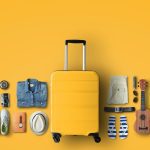Before Your Trip to Kenya
It is important to understand the essentials before embarking on your journey to Kenya in order to ensure an optimal experience. From the bustling streets of Nairobi to the vast savannahs of the Maasai Mara, Kenya offers a rich blend of culture, wildlife, and natural beauty. Whether you’re planning to embark on a safari, explore local markets, or enjoy the scenic landscapes, being well-prepared will enhance your trip. This guide provides practical advice on weather, packing, health precautions, and cultural norms, ensuring a smooth and enjoyable visit to this vibrant East African country.
The Weather in Kenya
Kenya experiences a diverse climate, influenced by its geographical variations. Generally, the country has two main seasons: the dry season and the rainy season. The dry season, from June to October, is the best time for wildlife viewing as animals congregate around water sources. Temperatures range from 20°C to 28°C (68°F to 82°F), with cooler evenings, especially in higher altitudes like Nairobi and the Central Highlands.
The rainy season occurs in two phases: the ‘long rains’ from March to May and the ‘short rains’ from November to December. During these periods, temperatures remain warm, ranging from 24°C to 30°C (75°F to 86°F), but the increased humidity can make it feel hotter. Coastal regions, including Mombasa and Diani Beach, tend to be warmer and more humid year-round, with temperatures ranging from 26°C to 32°C (79°F to 90°F). The weather can vary significantly, so it’s advisable to check local forecasts when planning your trip.
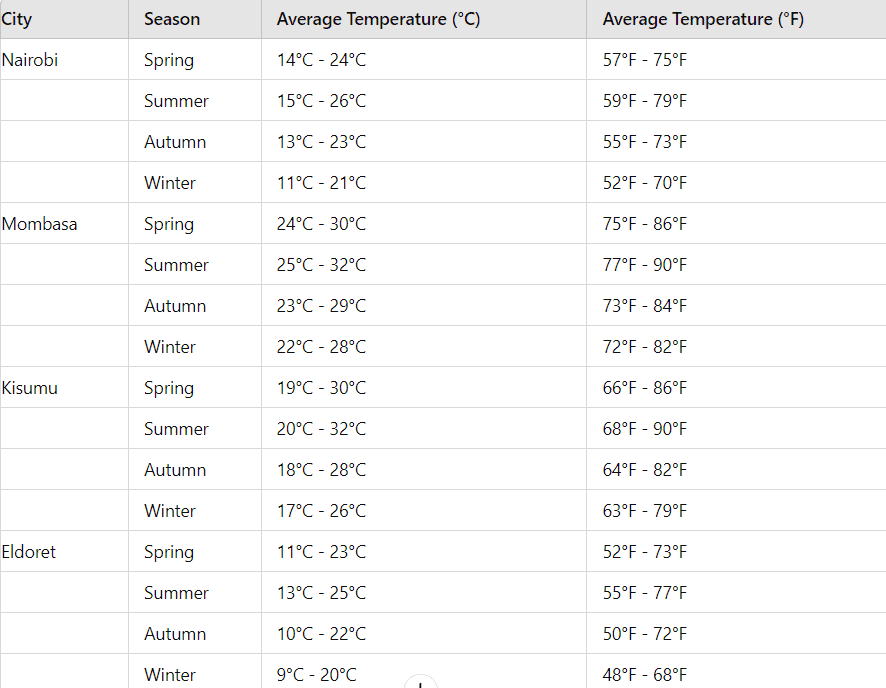
How to Dress in Kenya – Seasonal Considerations
Summer
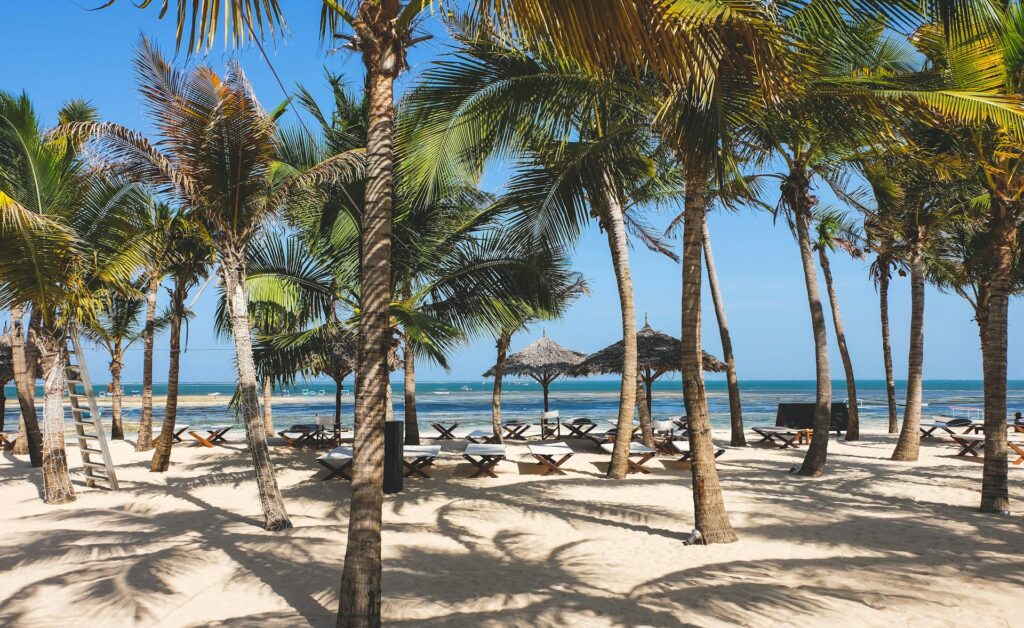
In Kenya, summer generally means warm to hot temperatures, especially in the coastal and lowland regions. Light, breathable clothing made of natural fabrics like cotton and linen is ideal for staying cool and comfortable. A wide-brimmed hat, sunglasses, and sunscreen are essential to protect against the intense sun. For coastal areas like Mombasa, consider swimwear and lightweight beachwear, but remember to dress modestly when away from the beach.
Fall
As temperatures start to cool slightly in the fall, especially in the highlands and central regions, it is advisable to layer your clothing. Lightweight long-sleeve shirts, light jackets, or sweaters can help manage the varying temperatures throughout the day. Evenings can be cooler, so packing a warmer layer is recommended. Comfortable, sturdy footwear is also important for exploring rural areas or engaging in outdoor activities.
Winter
Winter in Kenya, particularly in the highland regions, can bring cooler temperatures, especially at night and early mornings. Warm layers such as sweaters, jackets, and even a lightweight coat are recommended. While daytime temperatures are generally mild to warm, it’s best to be prepared for chilly conditions. In coastal areas, the temperatures remain relatively warm, but evenings can still be cooler compared to summer months.
Spring
Spring brings mild and pleasant weather across much of Kenya. It’s an ideal time for outdoor activities, so comfortable, casual clothing is suitable. Layering is again a practical approach, as mornings can be cool, warming up by midday. Waterproof or water-resistant clothing might be useful during this period, as spring can sometimes see short bursts of rain. Light jackets or sweaters are useful for varying temperatures, and a sturdy pair of shoes is ideal for exploring the diverse landscapes.
The Currency in Kenya
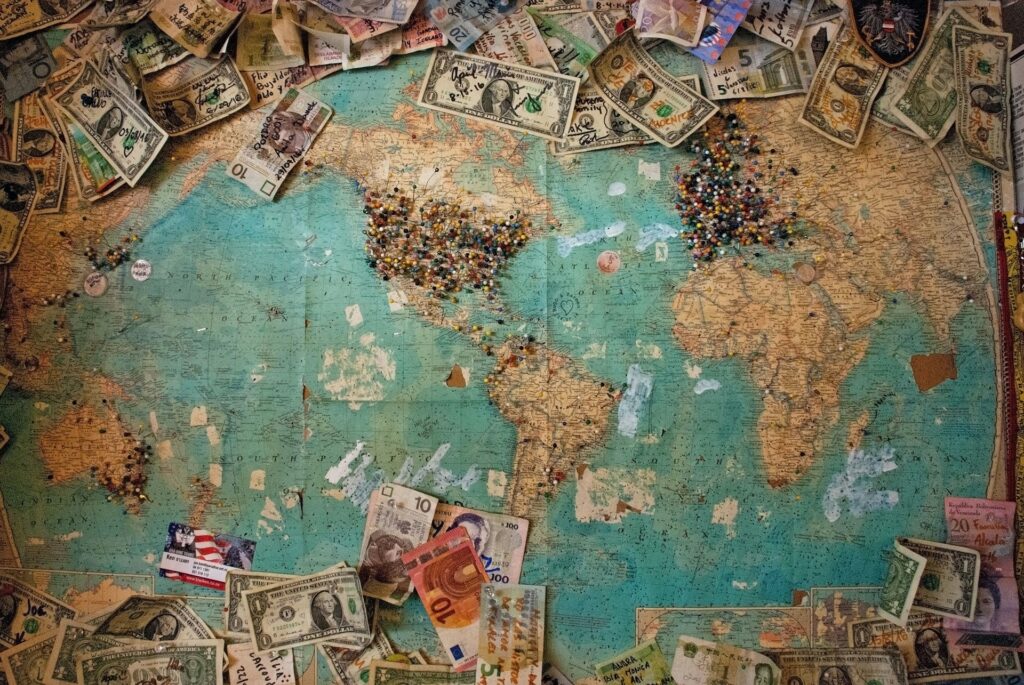
The official currency of Kenya is the Kenyan Shilling (KES). When traveling in Kenya, it’s essential to have some local currency on hand for everyday expenses, especially in smaller towns and rural areas where card payments might not be widely accepted. The Kenyan Shilling is available in both coins and notes, with denominations ranging from small values useful for minor purchases to larger notes for more significant transactions.
For travelers, it’s convenient to use credit and debit cards in major cities, tourist areas, and larger establishments such as hotels, restaurants, and shopping centers. However, it’s advisable to carry cash for market shopping, tipping, and paying for services in less urbanized regions. ATMs are widely available in cities and towns, allowing easy access to cash.
Which Currency Can Tourists Use in Kenya?
Tourists in Kenya use the Kenyan Shilling (KES) as the official currency for transactions. While some larger hotels, restaurants, and tourist areas may accept U.S. dollars, Euros, or British Pounds, it’s generally advisable to use local currency for most purchases, especially in rural or less touristy areas.
Where to Exchange Money in Kenya?
Money can be exchanged at banks, authorized forex bureaus, and some hotels in major cities and tourist destinations in Kenya. ATMs are also widely available, allowing tourists to withdraw Kenyan Shillings using international debit or credit cards. However, it’s recommended to use official exchange points to avoid high fees and unfavorable rates.
Tips for Exchanging Money in Kenya
When exchanging money in Kenya, it’s best to carry small denominations of U.S. dollars, Euros, or British Pounds, as these are more easily exchanged. Always check the current exchange rates and compare them at different bureaus for the best deal. Avoid exchanging money on the streets to prevent being scammed or receiving counterfeit bills. Additionally, keep receipts of all transactions as they may be required when converting leftover Kenyan Shillings back to your currency of origin.
The Language in Kenya
In Kenya, the official languages are English and Swahili. English is widely used in business, government, and education, making it easy for tourists to communicate, especially in urban and tourist areas. Swahili, also known as Kiswahili, is the national language and is spoken across the country. It serves as a lingua franca, bridging the various ethnic groups that speak different native languages.
Beyond English and Swahili, Kenya is home to over 60 ethnic groups, each with its own language or dialect. In rural areas, you may encounter people speaking their native tongues, although many also speak Swahili or English. In more remote regions, especially among older generations, Swahili may be more commonly spoken than English. While most people in the hospitality and tourism industry speak English, learning a few basic Swahili phrases can enhance your travel experience and is appreciated by locals.
The Necessary Documents and Emergency Contacts
Visa and Passport for Kenya
To enter Kenya, tourists generally need a valid passport and a visa. The passport must be valid for at least six months beyond the intended stay. Visas can be obtained online through the eVisa system, at Kenyan embassies, or upon arrival at the airport, though it’s advisable to secure an eVisa beforehand to avoid delays. Different visa types are available depending on the purpose and length of stay, including tourist, business, and transit visas. Be sure to check the specific visa requirements for your nationality, as they can vary.
Travel Insurance
You must have travel insurance with a minimum medical, evacuation and repatriation coverage of US$50,000 covering all applicable dates of travel with the Tour Operator. This insurance must cover personal injury and emergency medical expenses. On the first day of each Tour, a representative of the Tour Operator will verify that you have sufficient insurance in place. You are strongly recommended to extend your coverage to include cancellation, curtailment, and all other expenses that may arise as a result of loss, damage, injury, delay or inconvenience while traveling. You acknowledge that insurance coverage is not included in the cost of any Tour offered by the Tour Operator, and you are required to obtain separate coverage at an additional cost. It is your responsibility to ensure that you have sufficient coverage and comply with the terms of the applicable insurance plans. You are responsible for advising your insurer of the type of travel, destination(s) and activities included in your booking so that the insurer may provide appropriate coverage.
Travel Vaccines for Kenya
Before traveling to Kenya, it is recommended to ensure that all routine vaccinations are up-to-date. Additionally, travelers should consider vaccines for diseases such as Hepatitis A and B, typhoid, yellow fever, and rabies, especially if they plan to visit rural areas or engage in activities like wildlife tours or adventure sports. A yellow fever vaccination certificate may be required for travelers coming from countries with risk of yellow fever transmission. It’s advisable to consult a healthcare provider or travel clinic well in advance of your trip to discuss the necessary vaccinations and health precautions.
Essential Emergency Numbers in Kenya
In case of emergencies while in Kenya, it’s crucial to be aware of the essential contact numbers:
Police; 999 or 112
Fire Department: 999 or 112
Medical Services, 999 or 112
Kenya Red Cross, +254 20 3950000
Tourist Helpline, +254 20 604767
Vegetarian, Vegan and Gluten-free Eating in Kenya
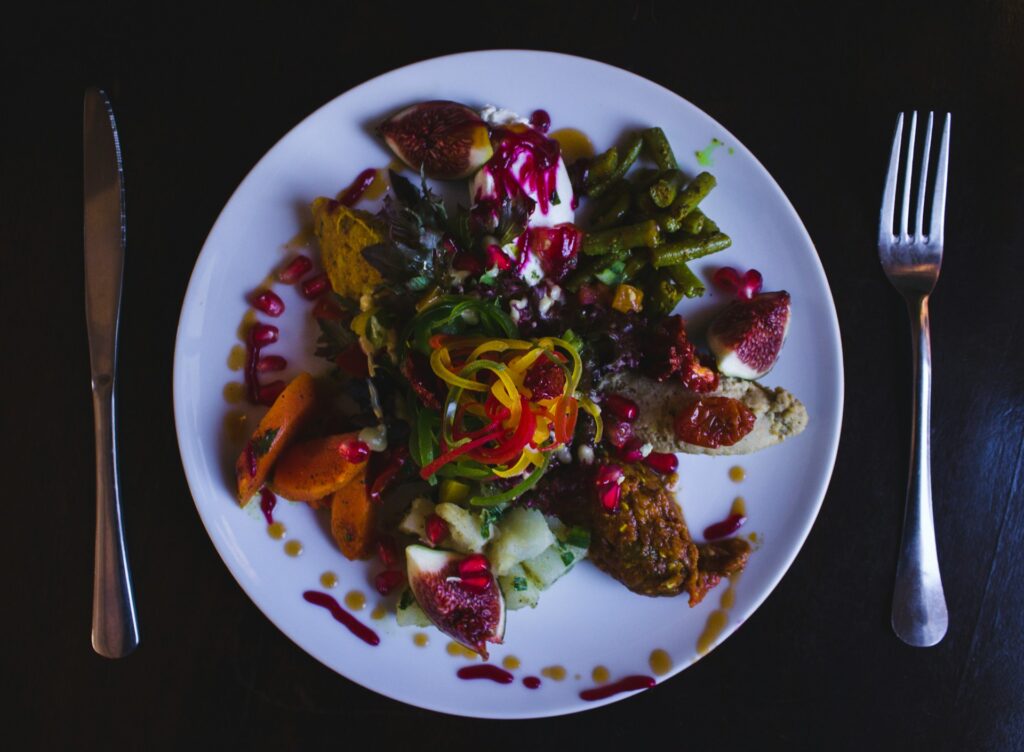
In Kenya, you’ll find a range of vegetarian, vegan, and gluten-free options if you’re prepared to explore a bit. Traditional dishes such as vegetable stews, sukuma wiki, and irio are naturally vegetarian and can be easily adapted for vegan diets. Chapati, a type of flatbread made from just flour and water, complements many meals. In larger cities like Nairobi and Mombasa, there are restaurants specifically catering to vegan and vegetarian diets, making it easier to find suitable options. Fresh fruits and vegetables are abundant and can be a great addition to any meal, especially if you’re preparing your own food.
For those following a gluten-free diet, Kenya offers a variety of naturally gluten-free foods. Maize-based dishes like ugali and rice are staple parts of the diet and can be enjoyed with various side dishes and stews. Potatoes are also widely used in local cuisine and provide a good alternative. While some traditional dishes like samosas are typically made with wheat flour, many restaurants and street vendors may be able to offer gluten-free options or adjust recipes upon request. Always check ingredients in sauces and marinades to ensure they meet your dietary needs. With a bit of planning, you can enjoy a diverse and satisfying diet while traveling in Kenya.
Do’s and Dont’s in Kenya
Do’s in Kenya
- Greet people warmly with a handshake.
- Respect local customs and traditions.
- Dress modestly, especially in rural areas.
- Ask for permission before taking photographs.
- Sample local cuisine and try new dishes.
- Follow wildlife guidelines provided by guides.
- Use reliable transport options.
- Adhere to local environmental practices.
Don’ts in Kenya
- Avoid speaking loudly in public places.
- Refrain from displaying large amounts of cash or valuables.
- Don’t engage in activities that harm wildlife or their habitats.
- Avoid drinking tap water or consuming ice from unreliable sources.
- Don’t ignore local dress codes or cultural sensitivities.
- Avoid public displays of affection, which may be considered inappropriate in some areas.
What to Pack for Kenya?
Travel Adapter for Kenya
In Kenya, the standard plug type is the British-style Type G, which has three rectangular prongs. The voltage is typically 240V with a frequency of 50Hz. If your devices use a different plug type or operate on a different voltage, you’ll need a travel adaptor to ensure compatibility. Adapters can be easily found in travel stores or online before your trip.
Additionally, consider bringing a voltage converter if your electronics are not dual voltage, as using a device that is not compatible with Kenya’s 240V can cause damage. It’s also a good idea to check if your accommodation provides universal charging stations or adapters for guests, which can be a convenient option.
Wifi Access and Mobile Connectivity in Kenya
In Kenya, Wi-Fi access is commonly available in urban areas, hotels, restaurants, and cafes. Many accommodations and public spaces offer free Wi-Fi, though the quality and speed can vary. In more remote areas, internet access might be limited or less reliable, so it’s a good idea to check availability before traveling to these locations.
For mobile connectivity, Kenya has a robust network with several major providers, including Safaricom, Airtel, and Telkom. Purchasing a local SIM card can offer affordable data plans and calls, making it easy to stay connected. SIM cards are readily available at airports, supermarkets, and mobile provider shops. Ensure your phone is unlocked and compatible with local networks to take advantage of these options.
In Your Suitcase
- Lightweight, breathable clothing suitable for warm temperatures
- Layers for cooler evenings or early mornings
- Comfortable walking shoes for safaris or city exploration
- Sandals for casual wear
- Travel adaptor to fit local power outlets
- Special dietary items, such as probiotics, if needed
- A small travel umbrella or rain jacket for unexpected weather
- A camera or smartphone with ample storage for capturing memories
- A good quality lock for securing your luggage
In Your Daypack
- Wide-brimmed hat to protect against the sun
- Sunglasses with UV protection
- Sunscreen with high SPF
- Insect repellent to guard against mosquitoes
- Reusable water bottle to stay hydrated
- Basic first-aid kit with essentials like band-aids, antiseptic, and pain relievers
- Necessary medications, including any prescriptions or over-the-counter items
- Snacks for quick energy during excursions
- A compact travel guide or map for navigating
- A portable phone charger or power bank to keep your devices charged







